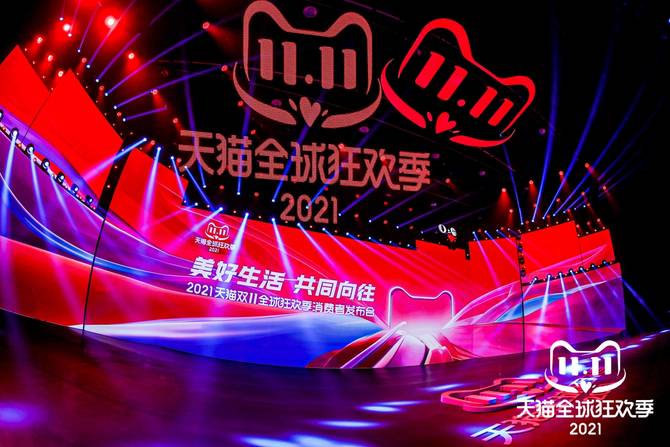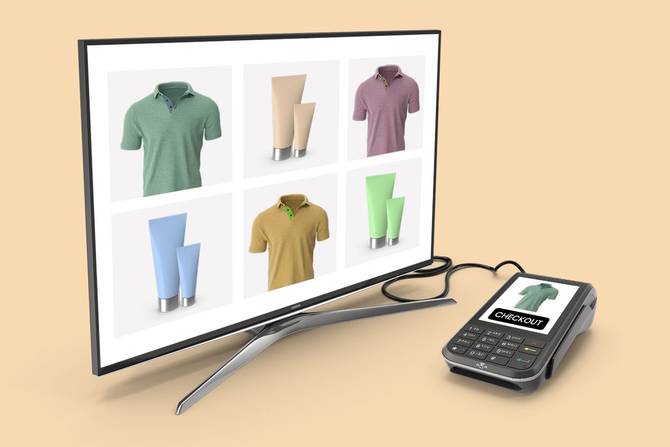Hey, hey, hey. We’re still hyped from all the Reese’s peanut-butter pumpkins we ate last night, so let’s get right into it.
In today’s edition:
- What we know about Alibaba’s 11.11 bonanza (so far)
- Livestream shopping’s major obstacle
- Sequential gets a buyer for its activewear brands
—Jeena Sharma, Julia Gray, Katishi Maake
|
|
|
Alibaba
Hold off on Black Friday for a minute, because 11.11 is coming in hot.
By the numbers: In 2020, the event generated about $74.1 billion in gross merchandise volume for Alibaba from November 1 to 11.
-
In comparison, US online sales for Thanksgiving, Black Friday, and Cyber Monday altogether totaled $25 billion last year.
- Out of the 250,000 brands that participated in Alibaba’s Singles Day in 2020, about 31,000 were international; US–based companies emerged as the top sellers, after China.
This year, with 290,000 brands—a new record—taking part, Tmall predicts 14+ million deals will be up for grabs for 900 million Chinese consumers. And like in 2020, Singles Day won’t be relegated to just one day, with Alibaba kicking off its official sales bonanza today.
What’s different? Tmall is emphasizing sustainability this year. It will feature a dedicated section for energy-efficient and low-impact products, as well as issuing $15+ million (100 million yuan) worth of “green” vouchers to incentivize shopping decisions. For example, consumers could get ~$15 (100 yuan) off after purchasing energy-efficient consumer electronics.
- Tmall is also working with brands to encourage eco-friendly consumption, including developing new low-carbon products with Unilever and plastic-free recyclable packaging with L’Oréal.
Plus, plus, plus: Alibaba’s logistics division Cainiao Network will roll out package recycling across 10,000 of its Post Stations in 20 cities in an effort to curb the festival’s carbon footprint.
Small gains
This year’s event will also spotlight emerging brands more than ever before, with Alibaba and Tmall bringing back their pitch festival for US, UK, and Irish companies.
“The goal of [pitch fest] is identifying and incubating several of the small emerging brands and fast-tracking them to have them participate in 11:11, and really get a lot of eyeballs for them to build brand awareness,” Tony Shan, head of Tmall Global for the Americas, told Retail Brew. “We want to help US brands target and find growth in the China market.”
“Building momentum and scaling it into a blockbuster sales day stateside remains a persistent opportunity,” added Vivek Pandya, senior digital insights manager at Adobe.
Click here to read more on what we know about 11.11 so far.—JS
|
|
|
Francis Scialabba
Livestream shopping—wait! You’ve read a million articles on the next big thing in social commerce. Still in its infancy in America, livestream shopping is already making retailers and social media companies rethink their digital-shopping strategies. Facebook has its live shopping event series (which it extended for the holidays). Even Albertsons partnered with a short-form video platform. But why hasn’t livestream shopping, expected to be an $11 billion industry by the end of 2021, taken off in the US the way it has in China?
Obstacles ahead: Well, according to Coresight Research’s CEO and founder Deborah Weinswig, existing purchasing processes are holding things up. “Payment is the biggest problem right now,” Weinswig told Retail Brew. She mentioned that shoppable video platform Firework, which Coresight partnered with for a virtual retail event, sees 90% of sales occurring after livestreams end.
As it stands, most purchasing involves clicking out of the livestream, toggling over to a retailer’s website, adding in your contact and payment info...I’m tired just typing this. “It’s the lack of one-click,” she said.
Game plan: Weinswig believes there are a few ways to alleviate payment pain points. There are existing technologies, like Bolt’s one-click checkout, that can help streamline the livestream. Gamification is another key to live-shopping success. Offering incentives, like a giveaway, for people who tune in for a full stream makes a post-view purchase more likely.
“The sales will come. I think that this will be bigger and certainly a much more profitable sales channel than e-commerce,” Weinswig added. “In two to three years, it’ll be the fastest growing channel.”—JG
|
|
|
Okay, fine—we haven’t actually time-traveled, but this report from Square did give us a pretty good idea of what the future holds for retailers.
Square’s report, The Future of Retail & Shopping, gives retailers analyses, strategies, and insights into how their world has shifted and upgraded this year, and what it means for the next age of the retail experience.
To help retailers define and own their success today and tomorrow, Square partnered with Wakefield Research to see how 500 retail managers and 1,000 consumers are moving forward in the world of retail. Here’s a sneak peek:
- 88% of retailers are now selling online
- 40% of online revenue comes from social selling, for retailers selling on social media
From new trends to customer expectations, Square has found that consumers aren’t just craving convenience, they also want connection.
For all industry insights, read Square’s report here.
|
|
|
Francis Scialabba
Galaxy Universal is making a run for it.
The firm on Friday agreed to acquire Sequential’s active brands—including And1, Avia, Gaiam, and SPRI—for nearly $330 million.
- Sequential filed for Chapter 11 bankruptcy protection in August, citing “significant debt on its corporate balance sheet.”
- The deal should close in mid-November, but is subject to approval.
The move builds on Galaxy’s existing portfolio of athletic, work, and outdoor products. Earlier this year, Galaxy bought up Apex Global Brands—which brought Hi-Tec, Magnum, and Tony Hawk, among other brands, under its umbrella.
“In this everchanging marketplace, we are strategically positioned to deliver on the customers’ constantly evolving expectations,” Eddie Esses, Galaxy’s CEO, said in a statement.
- The company already sells athletic and footwear in 40,000+ stores.
Zoom out: The M&A market for activewear has been heating up. In August, Adidas struck a deal to sell Reebok to Authentic Brands Group for a cool $2.5 billion. That same month, Wolverine World Wide Inc. and Levi Strauss & Co. moved on deals to acquire Sweaty Betty and Beyond Yoga, respectively.—KM
|
|
-
Coca-Cola is paying $5.6 billion to fully own BodyArmor in its largest brand acquisition ever.
-
Uber and Bed Bath & Beyond announced a new partnership that will add a baby-and-kids category to Uber Eats.
-
Matchesfashion saw revenues decline for the first time since 2007, when it introduced e-comm, on top of a loss of ~$50 million last year.
-
Skechers is reportedly considering taking its Asia business public.
|
|
|
|
Retail customers would like a word. The retail landscape has shifted, so Kustomer surveyed 500 American consumers to better understand the evolved expectations for customer service. Turns out, the business impact of poor customer service is a doozy: 90% of customers would stop shopping at a retailer providing bad customer service. Read the free report here.
|
|
Today’s top retail reads.
It’s a vibe: Why Chinese influencers are all about Shanghai’s Costco store. (CNN)
Keep the faith: What retailer doesn’t have a loyalty program at this point? But is it as effective as it should be? (Harvard Business Review)
No holding back: Scott Galloway digs into Warby Parker, Allbirds, On, and Rent the Runway’s IPOs. (No Mercy / No Malice)
Dropping knowledge is what we do. Check out our Home for the Holidays hub from Retail Brew, sponsored by Square. It’s packed with articles we wrote to help retailers head into the holidays with confidence.*
*This is sponsored advertising content.
|
|
At the mall, it’s where band tees are the only tees. In Retail Brew, it’s where we invite readers to weigh in on a trending retail topic.
There’s a lot going on in the world of Amazon right now.
Last Thursday, the e-comm giant reported lackluster earnings, with revenue up 15% in Q3 compared to 37% in 2020. (Plus, revenue from Amazon’s service biz outpaced its retail operations for the first time ever.)
-
Worker shortages are also cutting into Amazon’s one-day-delivery ops, Reuters noted. Amazon said it expects to spend an additional $4 billion on labor expenses in Q4.
Oh, and a bipartisan group of Senators plans to introduce antitrust legislation that targets marketplaces who prioritize their own goods; Amazon has been accused of using product information from sellers to improve its own brands.
You tell us: What is the biggest issue that Amazon faces right now? Cast your vote here or on Twitter.
Put a pin on it: Last week, we asked if it would make sense for a company like Paypal to acquire Pinterest. Just over half (56.8%) believe so, but almost a third (32.4%) don’t think that’s the case.
|
|
Catch up on the Retail Brew stories you may have missed.
|
|
Dropping knowledge is what we do. Check out our Home for the Holidays hub from Retail Brew, sponsored by Square. It’s packed with articles we wrote to help retailers head into the holidays with confidence.*
*This is sponsored advertising content
|
|
|
Written by
Jeena Sharma, Julia Gray, and Katishi Maake
Was this email forwarded to you? Sign up
here.
WANT MORE BREW?
Industry news, with a sense of humor →
-
HR Brew: analysis of the employee-employer relationship
Tips for smarter living →
 Podcasts →
Business Casual
and
Founder's Journal
Podcasts →
Business Casual
and
Founder's Journal
Accelerate Your Career →
-
MB/A: virtual 8-week program designed to broaden your skill set
|
ADVERTISE
//
CAREERS
//
SHOP
//
FAQ
Update your email preferences or unsubscribe
here.
View our privacy policy
here.
Copyright ©
2021
Morning Brew. All rights reserved.
22 W 19th St, 8th Floor, New York, NY 10011
|
|








